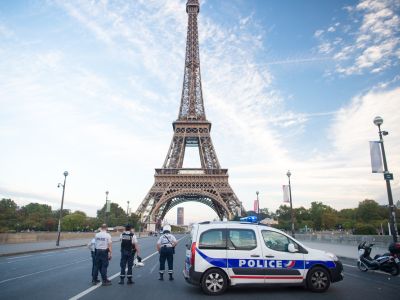The U.N. investigator for human rights violations in the Palestinian territories resigned Monday, saying that Israel had reneged on its pledge to grant him access to the occupied West Bank and Gaza.
Makarim Wibisono, United Nations special rapporteur on the situation of human rights in the Palestinian territories, said that his repeated oral and written requests for access had gone unanswered over 18 months.
In a statement announcing his resignation, Wibisono, who reports to the U.N. Human Rights Council, voiced “deep concern at the lack of effective protection of Palestinian victims of continuing human rights violations and violations of international humanitarian law.”
Israel has long rejected the post of the independent investigator for the territories, accusing the 47-member state forum of bias against the Jewish state, a position backed by its main ally the United States.
“The Israeli decision was the consequence of the distorted and biased mandate given to the rapporteur,” Emmanuel Nahshon, Israel’s Foreign Ministry spokesman, said by email.
“Israeli human rights are violated too, every day, by Palestinians and until ignoring this ends the council will not be taken seriously as a body that respects human rights,” he said in a separate statement.
Wibisono, a former Indonesian diplomat who took up the U.N. post in June 2014, said in his first report to the council in March 2015 that Israel should investigate the killing of more than 1,500 Palestinian civilians, one third of them children, during the 2014 Gaza war, and make the findings public.
His resignation is effective on March 31, after his final report to the council. “My efforts to help improve the lives of Palestinian victims of violations under the Israeli occupation have been frustrated every step of the way,” Wibisono said, adding the Palestinian government had cooperated fully.
His predecessor Richard Falk, an American law professor who is Jewish, long drew controversy in Israel. In 2008 Falk compared Israeli military strikes against Hamas in Gaza – during which 1,400 Palestinians were killed and there was widespread destruction in densely populated areas – to those of the Nazis.
Wibisono has proved less controversial, although he harshly criticized the deadly 2014 Gaza war, warning the “ferocity of destruction and high proportion of civilian lives lost in Gaza cast serious doubts over Israel’s adherence to international humanitarian law.”
And in November, Wibisono accused the Israeli security forces of using excessive force against the Palestinians and may have carried out summary executions as they sought to crack down on a wave of lone-wolf attacks with knives, guns, and cars.
In Monday’s statement, he voiced deep concern over the lack of protection for Palestinians who face an ongoing range of human rights violations. “It is my sincere hope that whoever succeeds me will manage to resolve the current impasse, and so reassure the Palestinian people that after nearly half a century of occupation the world has not forgotten their plight and that universal human rights are indeed universal.”
He stressed that it was important for Israel’s own human rights credibility to cooperate with the mandate and to provide access to the Palestinian territories.
A Palestinian Monday stabbed an Israeli woman in Jerusalem before being shot and wounded, police said. The man was later taken to hospital for treatment.
Israeli security forces had earlier demolished and sealed off the Jerusalem homes of two Palestinians involved in deadly attacks against Israelis in the city last year.
One attacker, Bahaa Elayan, opened fire on passengers on a bus in October, killing three. The same day, Alaa Abu Jamal rammed his car into pedestrians and then stabbed people, killing one. Both attackers were shot and killed at the scene.
Hundreds of Israeli police and soldiers were on site for the home destructions, which took place without incident after residents were cleared from the area.
“I don’t have any other place to live,” Elayan’s father Mohammad told AFP.
“The army just said ‘we are going to destroy the house, get out’ – this measure punishes a father, a mother, a brother, a sister and [four] children” who were living in the house, he said.
Israel claims home demolitions are an effective tool to deter attacks. Critics say the tactic amounts to collective punishment.










